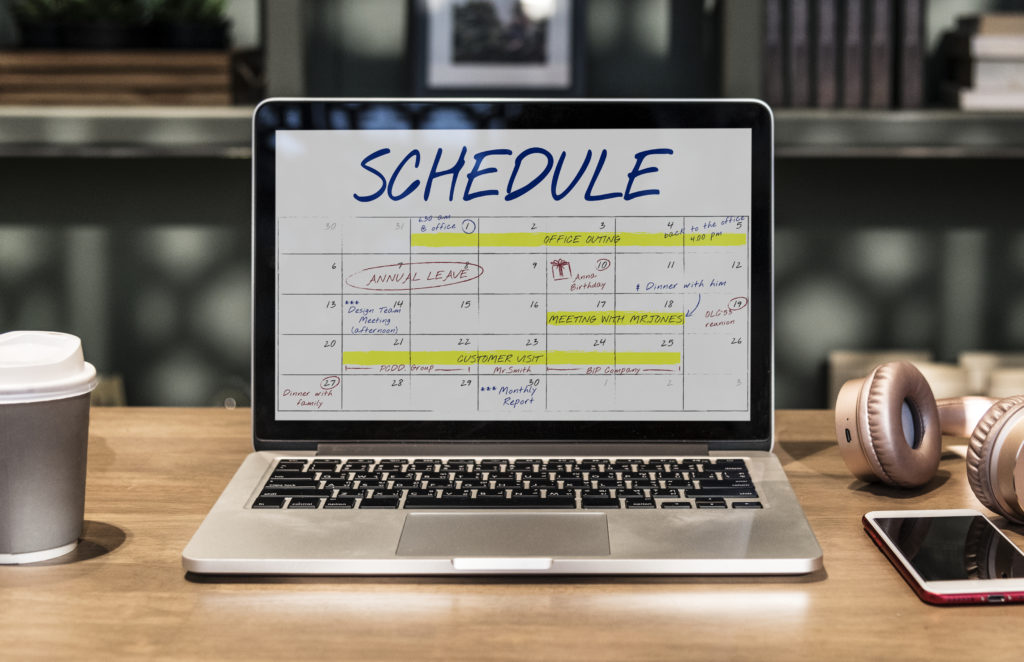Managing your mental health while working from home
Managing your mental health while working from home

Ah…Working from home. Sounds like the dream, doesn’t it? While the very thought of it conjures mental images of lounging in your PJs all day while you run the world from your kitchen table, managing your mental health while working from home isn’t necessarily the first thing that comes to mind.
With nearly 32% of working Canadians between 15-69 working most of their hours from home in 2021, working-from-home can at first, be an exciting time & money saver. However, as you’ll quickly learn, that feeling tends to wear off and you may end up with mental health challenges that come with working-from-home too including feeling lonely, depressed and unproductive at times.
With mental health in the limelight more than ever, it should be no surprise that mental health while working from home is a hot topic. As Canadians are feeling the effects of mental stress and anxiety, many have had to work from home more often than usual to avoid getting sick or infecting others.
This article will discuss how mental illness can affect your productivity at home, what you can do to maintain good mental health by taking care of yourself and staying healthy, signs & symptoms to watch for if you think something might be wrong with your mental health and finally who you can turn to for help.
Let’s discuss how you can take care of your mental health while you work and manage your business from home.
Factors of working-from-home that can affect our mental health

Poor time management & task management
Many people find their anxiety levels go up during this time because they feel “on call” all hours of the day or night if they aren’t careful about setting boundaries between their business life & social life.
You may have heard that staying productive while working from home is an important mental health practice during the pandemic, but many people overlook how crucial time management can be.
Constantly catching up with your tasks can drain your energy. This means you may end up falling even further behind because you don’t have enough energy and focus to keep the momentum going, further pushing your anxiety and stress upwards.
Some of the issues caused by poor time management can include:
- Burnout
- Inability to complete tasks or work
- Lack of personal care
- Diet and exercise issues
- Mental awareness and wakefulness
- A never-ending work day
- Lack of sleep
- Increased stress levels
Workload, stress and burnout while working-from-home
Working-from-home can feel as if you have an increased workload which can lead to stress and burnout. This occurs from the “endless work day”.
You know exactly when it happens too. You step away for a “quick” lunch break, make some sort of exotic meal (Why not? You can do this when you work from home!), then consume that meal in-front of the TV where you get stuck binge-watching the latest trending series (Tiger King anyone?).
Some quick-tips to remedy workload, stress and burn-out while working-from-home
- Having short 5-10 minute breaks hourly
- Buffer 10-minute breathing time between meetings & work times
- Scheduled lunch breaks, similar to what you would have in office
- Working similarly as you would in-office: dress-to-impress, work as if management is watching
- Communicate virtually the same way that you’d communicate in person
Task & time management is key when you consistently have a heavy workload.
Lack of sleep/rest
With nearly 50% of Canadian adults having trouble going to sleep or staying asleep at night, working-from-home surely hasn’t helped. Good sleep habits are part of a healthy and sustainable lifestyle.
Get your zzz’s. Lack of sleep can reduce brain function and alertness by as much as 40%, not to mention it can significantly dampen your mood!
One of the worst factors from working from home can be losing sleep over the “never ending workday”. This phenomenon happens when you have poor time management, causing tasks to never be completed.
Lack of sleep caused by working from home can also happen from anxiety of walking past the home-office setting, especially if your home-office is in your bedroom.
Some recommended top tips to a better night’s sleep while working-from-home
- Avoid screen-time at least an hour before bed
- Follow a scheduled wake up and bedtime routine
- Take work breaks in another room / outside
- Do not work in bed
It’s no secret that poor mental health can cause sleep problems. Your body needs proper sleep, just as it needs air and food to function at its best.
It’s also well-known that lack of sleep or rest has a negative effect on mental health. But what is less commonly known is the impact of not getting enough sleep on physical health.
Studies show there are many different ways in which mental and physical illnesses feed off each other, with one making the other worse.
One way this happens is through our immune system. When we don’t get enough mental or physical rest, our immune systems start to break down due to stress hormones like cortisol and adrenaline flooding the bloodstream; they’re constantly working overtime because your body never gets a chance to “reboot”.
The Public Health Agency of Canada recommends between 7-9 hours of sleep/night.
When you combine this with neglecting basic needs like mental breaks throughout the day or keeping yourself well-maintained physically, mental stress has a much stronger chance of developing into mental illness.
Weakened immune systems are not something you want to be battling with during flu seasons, let alone an active pandemic.
Keep your mental health in check while working from home with these daily self-check habits

Since you’ll be working-from-home, you can actually build repeatable and healthy habits. It’s the perfect time to replace the commute with new means of preparing yourself to start your day and wrapping up your workday.
Read on to learn more about simple steps you can take to build mental strength and positive work habits.
Create a proper work-life balance. Separate work FROM home.
Gaining control of your work life in order to balance your personal life is key. This important point is commonly forgotten when you work from home.
When working from an office setting, you have the opportunity to prepare yourself for your work day, commute to the office, put in your work day and commute back home with time to unwind on the drive. You don’t get to enjoy that luxury when you work from home anymore.
You can easily regain control of your work-life balance while working-from-home by:
- Disconnecting
Having a strict work schedule that you adhere to with one or two days of potentially extra scheduled time is key to preventing burnout. Try to completely avoid screen-time whenever possible on personal time, including watching TV. Get outside, disconnect and enjoy.
- Separate your work-space
Whether it’s within its own room with a closing door, an entire basement or even an office shed, keeping your work-space separate from your living or sleeping space is key to maintaining a healthy mindset and disconnecting.
- Limit distractions and time-sucks
- Eliminate household time-sucks, set a timer when stepping away for a meal, snack or a mental refresh.
- Wear headphones, and depending on your type of work, play a motivating playlist or listen to motivational podcasts to keep you focused.
- Limit some of your text or Slack discussions and make a quick call to prevent excessive responses or delays that could have been accomplished in a quick Zoom or phone call.
Overcome self-doubt through self-affirmation
Hear us out. We know this may sound cheesy to some of you, but self-affirmation actually works in preparing your mind for the day and reminding yourself of your strength as you find footing to start the day or week.
As a business owner, you need to have plenty of belief and self-love to be able to push past doubts, insecurities, and worries.
According to Tony Robbins, this can be achieved in 6 steps:
- Identify your limiting beliefs
- Change your self-talk
- Focus on your desires
- Surround yourself with support
- Take action
- Build resilience
You can read more about the steps and actions in this great article.
Meditation
Meditation is common practice amongst some of the world’s most successful people. Why not introduce yourself to this same practice to enhance your ability to work from home and maintain a healthy, balanced and less-stressful lifestyle as well.
During meditation, you can focus your attention inwards and eliminate the stream of jumbled thoughts that may be crowding your mind and causing stress, until you achieve clarity and peace, even if only for a few minutes.
If you include meditation into your regular routine for starting and finishing work, you’ll find that you will:
- Maintain a positive mindset & positive attitude
- Stay disciplined
- Maintain focus and attention
- Reduce negative thoughts and emotions
- Increase creativity and imagination
- Increase patience and tolerance
- Build stress-management skills
Meditation is a simple and fast way to reduce stress and improve your general well-being.
A few applications we would recommend using for meditation and mindfulness include:
Listening to music, podcasts and reading books
In a recent study of 56 Canadian software developers from four different companies, they were tested on the effects of listening to music while working, assessing the quality of work and time on task.
What they found was that the value of music listening while working provided a positive mood change and enhanced perception on design while working.
Compared to when there was no music, the quality-of-work was the lowest and the time-on-task was the longest when it was removed.
It may seem counterintuitive, but listening to music can actually reduce mental stress—even if you are reading or listening to something that is not your favourite genre.
Consider also reading or listening to podcasts on break-times as well. Research has shown that just being around any information increases mental health—whether it is information about your favourite subject or not. This mental break helps the brain process the day’s events. With this mental break, you return to mental tasks with renewed energy.
Listening to music is also a great mental break for your brain. Music functions as a mood enhancer because it changes the chemistry of your brain by releasing serotonin.
Wondering what kind of music will make you the most productive? Hubspot has compiled a list of 7 scientifically-backed office music playlists for productivity, check that out here.
Taking breaks
We can’t stress this enough: you are not a robot. You are working to live and not living to work.
Ensure you have the time scheduled aside where no one can book-into your calendar or take-up that necessary break time.
Even micro-breaks can be more beneficial than not taking any breaks at all. In a 2013 study by researchers from the University of Sherbrooke in Quebec, they tested a surgeons’ ability to draw a star with scissors, those who took microbreaks were 7x better than those who hadn’t.
Taking multiple breaks throughout the day eases your body and refreshes your brain’s mental stamina.
You’ll also find yourself getting less lost into personal distractions such as getting lost in social media or moving unnecessarily between tasks without completing the previous one.
Regular practices you can do to help maintain good mental health at home

Time management and scheduled routines both at home and at work can greatly improve your body’s ability to handle stress.
Maintaining a schedule and work structure
According to Ramon Solhkhah, M.D., chair, Department of Psychiatry, Jersey Shore University Medical Center, “While many of us complain about how busy our schedules are, it represents expectations and patterns that are an important component of good mental health.”
So make use of your online calendar and don’t hesitate to create a schedule you can use to guide yourself so that you can avoid being stretched out by work, tasks or even distractions that you may be unnecessarily fixated on.
There are free online calendar applications & scheduling software that work extremely well for keeping yourself scheduled properly. Some apps to consider helping you with scheduling your time include:
- Google Calendar: A great, free online calendar that can be used for reminders and scheduling.
- Calendly: An automatic appointment & calendar solution that can be used for clients and staff to book appointments into time slots you set as open in your calendar. You can leverage great features such as appointment buffers and have it sync automatically with Google Calendar for time-off, holidays, personal appointment overlap prevention and more.
Delegating tasks
One of the hardest things you can do as an owner or manager is task delegation. When done properly, you can reap the benefits of trusting your team to complete tasks for you, saving you time and creating greater capacity within your personal schedule.
We understand that it may be difficult trusting other people to accomplish important tasks on your behalf. It can also be worrying to see the business you have been building being run by people who may not be as deeply invested in the establishment of your business as you are. But you have to give trust to gain trust. Also, you cannot spread yourself thin. You are not accomplishing anything well if you are juggling too many things at the same time.
Allowing other people to take over tasks and focusing on what you do best will not only free you up but also make you feel great about yourself and your work.
Tools you can leverage to make this easier for yourself and your team is if you implement task & project management software such as:
Physical fitness
Get your running shoes on, and go out for a good sweat session to kick off an early and strong start of the day!
You’ve heard it before: exercise helps produce endorphins or those feel good hormones. Some runners also experience a runner’s high after sprinting or jogging for a couple of kilometres. It is described as a euphoric boost of energy and mood through regular running.
Exercise doesn’t only provide happy hormones, it also improves alertness and brain function, which is why it doesn’t come off as a surprise that most thought leaders and self-made moguls follow a regular fitness regimen in one form or another.
The options are endless and a lot of them cost almost nothing. If you don’t have time to go to the gym, or you simply don’t feel comfortable going there, there are so many YouTube channels that provide free workout content.
All you need is yourself, an exercise mat, water, and maybe you can invest in a couple of dumbbells, free weights, kettlebells, or booty bands.
Don’t forget that BPGS has group health plans that can offer health spending accounts (HSAs), which help with purchasing things like fitness trackers or gym memberships.
Eating well

With 1 in 5 Canadians experiencing a personal mental health condition each year, nutrition can fuel your body and mind to help with coping with stress, and accomplishing tasks.
A healthy, well-balanced diet can help us think clearly and feel more alert. It can also improve concentration and attention span.
Poor diet can contribute to fatigue, impaired decision-making, and can slow down reaction time. In fact, an inadequate diet can actually lead to stress and depression.
One of the biggest health impairments is society’s reliance on processed foods. A lot of the processed foods we eat are highly addictive.
They stimulate the dopamine centers in our brain, which are associated with pleasure and reward. Sugar and processed foods can lead to inflammation throughout the body and brain, which may contribute to mood disorders, including anxiety and depression.
During hectic periods, a cup of coffee stands in for a complete breakfast, and fresh fruits and vegetables are replaced with high-fat, high-caloric fast food takeout. When feeling down, a pint of ice cream becomes dinner (or you skip dinner altogether).
To boost your mental health, eat more fruits and vegetables along with foods rich in omega-3 fatty acids, such as salmon. Dark green leafy vegetables in particular are brain protective. Nuts, seeds and legumes, such as beans and lentils, are also excellent brain foods.
ME time
Yes, we are going to say it: Treat yourself!
Treating yourself does not exactly mean checking yourself in at a 5-star hotel and going on a shopping spree (although you are free to do that). Pampering yourself from time to time can do you a lot of good.
You’re in business to create an ideal lifestyle for yourself and your family. Not the opposite.
You really do need to focus on closing your laptop lid on the weekends or during your lunch breaks to enjoy a glass of wine, go out for a walk to enjoy the sunshine, get a new haircut, watch an episode or a movie on your favourite streaming platform, visit an art exhibit or museum, or buy yourself a great pair of jeans or shoes — all these acts of self-love can keep your perspective of your life and enjoyment outside of work.
Having a support system
Connect with other work-at-home people & small business owners
Because of the phenomenal culture of working-from-home, several online groups, even on popular social media platforms, have popped up to form online communities of work from home folks who want to interact and share the joys and challenges of working-from-home.
There are groups for every kind of Work From Home situations including:
- Work From Home – 115k members
- Work From Home Moms & Dads – 71k members
- Work From Home Accountants/Bookkeepers – 147k members
- Working From Home Moms – 31k members
Just to name a few.
Join your local chamber of commerce and other small business networking groups
Whether it’s a local business networking mastermind group on Facebook or your local Chambers of Commerce, it’s important to network with other small business owners. There is a power in communicating with others who are in a similar situation.
- Bonnyville and District Chamber of Commerce
- Cold Lake Regional Chamber of Commerce
- St. Paul & District Chamber of Commerce
- Fort McMurray Chamber of Commerce
Some of these chambers and boards of trade may offer their own private facebook and networking groups, be sure to join them and request more details.
Maintain close and healthy friendships outside of work
A brunch every few weeks with your best friends and dinners and weekends with your family members can be very healthy for you. According to Mental Health First Aid, “healthy and close friendships encourage positive mental health and well-being.”
Your friends can provide respite from the stresses of running a business and encouragement when you don’t feel as good about yourself. Seeing your friends and family from time to time can also remind you of a sense of connection and belongingness even when most of the time you work by yourself at home with minimal social interaction.
Working from home can feel terribly lonesome at times especially when you are going through tough moments in your business, but sparing a little time away from work you can turn to your family and friends who can give you a boost and remind you that you still have a life outside of work.
Don’t be afraid to seek professional help when your mental health is already suffering.

Signs and symptoms of mental illness you should watch out for:
- Sleeplessness or oversleeping
- Persistent loss of focus
- Debilitating anxiety and/or sadness
- Loss of interest in accomplishing things
- Extreme mood swings
Getting professional help
Great therapy will give you a whole world of good
Cognitive behavior therapy has been growing in popularity over the past decade, especially with the advent of celebrities starting their interview answers with, “My therapist once said…” and the continuing mental health advocacy campaign of destigmatizing.
The Canadian Counselling and Psychotherapy Association encourages patients to make use of several reliable online resources to find a therapist for yourself, especially ones who can accommodate online sessions.
At the time of this article, online / virtual visits are currently covered for Counsellors/Psychotherapists under the Chamber Group Health Benefits Plan.
Getting on prescribed medications is okay too
If your symptoms are unbearable, persistent, and are getting in the way of your normal functions in life, you can also seek consultation with a board-certified psychiatrist who will be able to diagnose you properly and prescribe medication that can help alleviate your symptoms.
Remember to not self-diagnose nor self-medicate as this may lead to more serious problems and harm.
Are psychologists, psychotherapists, psychiatrists, acupuncturists, naturopaths or other forms of mental health care covered by my health benefits plan?
This depends on your business’s group’s health insurance plan. It’s best to reach out to us to discuss your plan coverage.
If you haven’t considered group health benefits already for your small business, you should also look into our partners at the Chambers of Commerce Group Insurance Plan who we’re partnered with to administer their health insurance plans.
Wrapping Up…
Working from home can be hard. With the right attitude, some motivation and discipline, it can be extremely rewarding, cost-saving and relatively stress-free. If you have any questions about coverage or health & dental plans for your [now] home-based business, please reach out to us to get a quote. Our team at BPGS is happy to help.






